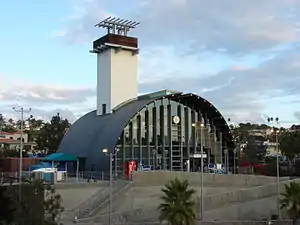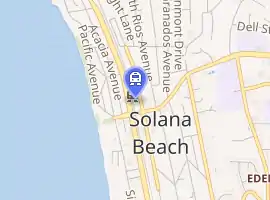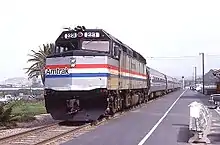Solana Beach station
Solana Beach, also known as the Solana Beach Transit Center, is a train station on Amtrak California's Pacific Surfliner passenger train and on North County Transit District's COASTER commuter rail route located in Solana Beach, California. The tracks were lowered to their current position in the late 90s, to alleviate congestion on Lomas Santa Fe Road and Downtown Solana Beach. There are two tracks that carry the Surf Line in a trench through the city of Solana Beach, including the station.
Solana Beach Transit Center Solana Beach, CA | |||||||||||||||||||||
|---|---|---|---|---|---|---|---|---|---|---|---|---|---|---|---|---|---|---|---|---|---|
 The exterior of the Solana Beach station | |||||||||||||||||||||
| Location | 105 North Cedros Avenue Solana Beach, California | ||||||||||||||||||||
| Coordinates | 32.9929°N 117.2713°W | ||||||||||||||||||||
| Owned by | Amtrak | ||||||||||||||||||||
| Line(s) | Surf Line | ||||||||||||||||||||
| Platforms | 2 side platforms | ||||||||||||||||||||
| Tracks | 2 | ||||||||||||||||||||
| Connections | |||||||||||||||||||||
| Construction | |||||||||||||||||||||
| Parking | Yes | ||||||||||||||||||||
| Bicycle facilities | Yes | ||||||||||||||||||||
| Disabled access | Yes | ||||||||||||||||||||
| Other information | |||||||||||||||||||||
| Station code | SOL | ||||||||||||||||||||
| Fare zone | 1 (COASTER) | ||||||||||||||||||||
| History | |||||||||||||||||||||
| Opened | 1994 | ||||||||||||||||||||
| Passengers | |||||||||||||||||||||
| 2018 | 388,823[1] | ||||||||||||||||||||
| Services | |||||||||||||||||||||
| |||||||||||||||||||||
| Location | |||||||||||||||||||||

| |||||||||||||||||||||
The station was designed by architect Rob Wellington Quigley, and was built in 1994 to replace the aging depot in Del Mar, California two miles south which had been in use since the early 1900s. Funding for the station included $2.8 million from Proposition 116, which was a ballot initiative that designated $1.99 billion for passenger rail projects.[2] An additional $3.3 million used for land acquisition and design was obtained through Transnet, a half-cent county sales tax.[3] Quigley drew inspiration for the design from a group of Quonset huts that used to line North Cedros Avenue in the 1940s. To the basic semi-circular form of the hut, the architect added a tower reminiscent of those found on many train depots dating to the second half of the 19th century.[3]
In the late 1990s, an $18 million project lowered the tracks and station platforms. This allowed for another track and platform and improved safety by eliminating the railroad crossing located south of the station.[3]
Solana Beach and the North County Transit District would like to convert the station and some of the adjacent surface parking into offices, a restaurant and an underground parking structure. This could involve the station being repurposed or demolished with ticket sales and other train services moved to the train track level. The parking garage could complement the Cedros Design District and adjacent Coast Highway 101.[4]
Of the 73 California stations served by Amtrak, Solana Beach was the tenth-busiest in FY2010, boarding or detraining an average of approximately 1100 passengers daily.[5]
Former Amtrak station at Del Mar

The former Del Mar station served passengers from the early 1900s until its closure in 1995, and for much of that time was the only passenger stop between Oceanside and San Diego. Solana Beach Station was planned from the beginning not only as a stop for both Amtrak and commuter trains, but also as a major local bus hub. As a result, the future of Del Mar Station, just two miles south, fell into doubt as early as 1989. At that time a committee of the San Diego Association Of Governments (SANDAG) voted in favor of its closure,[6] citing the limited availability of parking, the lack of handicapped access, and the logistical difficulty accommodating bus and shuttle service.[6] Any one of these problems, by itself, would have been a serious deficiency if Del Mar was to serve both commuters and Amtrak passengers. The Del Mar City Council rejected any significant expansion of the facility, while still hoping to keep it in operation as an Amtrak-only station, but Amtrak rejected this possibility, deciding in favor of Solana Beach instead. Today, the former station and its platform are still kept intact next to the active railroad, and it is often leased out for weddings or other special events.[7]
References
- "Amtrak Fact Sheet, Fiscal Year 2018, State of California" (PDF). Amtrak. June 2019. Retrieved 2 January 2020.
- "Proposition 116 - Clean Air and Transportation Improvement Act of 1990 | CTC". catc.ca.gov. Retrieved 2021-01-14.
- Great American Stations. Accessed February 20, 2013.
- Houck, Kristina (November 25, 2014). "Transit District to seek proposals on expanded footprint for Solana Beach train station property". Del Mar Times.
- "Amtrak Fact Sheet, FY2010, State of California" (PDF). Amtrak. November 2010. Retrieved 2011-01-06. External link in
|publisher=(help) - Ray, Nancy (October 28, 1989). "Del Mar Depot Faces Closure, Demolition : Mass Transit: Panel's vote means the railroad station would be abandoned by both Amtrak trains and rail commuter trains when a Solana Beach station is built". Los Angeles Times.
- Perry, Tony (March 12, 1995). "When Turf No Longer Meets Surf : Del Mar is feeling the pain of change. First, Amtrak sidelined the town's historic station. Now, a long-ignored law banning access to the beach via railroad property is being enforced". Los Angeles Times.